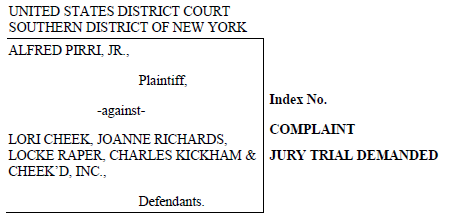Reversing the Patent on Reverse Online Dating
Patent – Patently-O 2017-09-29
For Friday enjoyment, I post Pirri v. Cheek. So far we only have a complaint associated with the dating site Cheekd that bombed on Shark Tank but is now gaining steam. [h/t Prof. Brian Love]

The idea behind Cheekd is “Online Dating in Reverse” – basically when you meet someone in person, you give them a business card links to your online dating profile. There is even a patent – U.S. Patent No. 8,543,465 claiming the process. [US8543465]. You can read Claim 1 for yourself, but my quick review lets me classify the patent as quite low quality; very difficult to infringe; and likely invalid under 101 (abstract idea).

Now, here comes Alfred Pirri Jr, a mild-mannered “single man living in the New York tri-state area.” Pirri had some difficulty finding a date — notably, he “keenly noted through his personal experiences that, although there were plenty of single people living in New York City, there were very few efficient ways a person could use to meet single people in order to date them.” In particular, Pirri lamented that “In a crowded bar, a person could be standing 10-feet from the person’s future spouse and never know it.” Around 2006, Pirri then had the idea – of reverse online dating as described above although he never filed for patent protection, he did consult with a patent attorney who “confirmed that no identical nor similar ideas were ever disclosed in registered patents, pending patent applications and non-patent publications.”
Although Pirri kept his idea quite secret, he did disclose the details of his idea to his personal counselor Joanne Richards (a licensed clinical social worker). According to the allegations, Richards disclosed the idea to a social acquaintance — “That social acquaintance was no other than Defendant Lori Cheek, one of the so-called inventors of the Cheek’d dating website and app.”

The tale goes on, but now we reach the lawsuit claiming:
- Unenforceability of U.S. Patent No. 8,543,465 (for lying about inventorship);
- Unjust Enrichment;
- Breach of Fiduciary Duty;
- Misappropriation of Trade Secrets;
- Unfair Competition;
- Conversion; and
- Fraud.
So far, we only have a complaint, but it will be interesting to watch to see how this moves forward. Assuming the allegations are are true, how do you rule?
= = = =
1. A method for personal meeting comprising the steps of: an initiator developing a profile with a central organization; the central organization providing the initiator by computer with a number of cards on which are printed at least an icebreaker, a website designation, and a code comprising elements corresponding to the icebreaker printed on the card; the initiator giving the card to at least one recipient; the recipient going to the website designated on the card; the recipient entering the code printed on the card at the designated website; the recipient being given access to the initiator’s profile with the central organization; the recipient sending a message to the initiator; and the initiator tracking activity comprising:
the central organization storing data by computer corresponding to when the recipient enters the code from the card bearing the specific icebreaker; the central organization storing data by computer corresponding to when the recipient sends the message to the initiator after the recipient has received the card bearing the specific icebreaker; the central organization compiling data by computer corresponding to a number of times the recipient enters the code from the card bearing the specific icebreaker and a number of times the recipient sends the message to the initiator after the recipient has received the card bearing the specific icebreaker; and the central organization displaying the compiled data by computer to the initiator.
= = = =